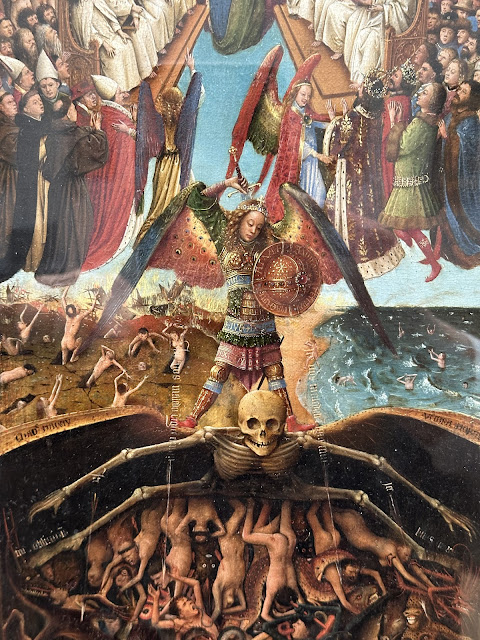Peace I leave with you; my peace I give to you;
not as the world gives do I give to you.
Let not your hearts be troubled,
neither let them be afraid. (John 14:27)
One of his great exhortations, from the day he began his Petrine ministry, is Be not afraid. This is the fruit of intimacy with the risen Jesus. This is what everyone who looked at him at any moment in his long and difficult life saw: freedom from fear. This is the freedom he spent his life to share with every person on earth.
The opposite message, the reverse goal, is the work of the opponent of human thriving. The accuser. The devil. Be afraid; be very afraid is what he whispers.
Which rings in my ears now whenever I listen to the rhetoric that floods our homes and our lives in these months and final days before our national election. The shouted instruction to Be afraid is the form and content of many a message, and the fruit is fear and trembling in many an otherwise sane and competent citizen.
But an article I read somewhere recounted the toll all this fear of the end of the nation, the end of our freedom, the end of all right order and good citizenship, is taking on children. Witnessing the histrionics of media personalities and the agitation of their parents and other adults on whom they rely for stability, destabilizes them into anxiety and incapacity.
A few years ago, the experts and leaders prescribed fear as the right disposition and guide during the pandemic. This caused grave and lasting harm especially to children. Now again, our kids find fear being thrust upon them by the very people they should have confidence will provide them protection. Parents give themselves over to the fear pushed on them by the influencers and spread that fear one to another over this or that rumor, threat, or accusation. The kids see and hear this, absorb it, and make it their own. They are anxious and afraid.
This election will not be the beginning of some temporal apocalypse. It is almost funny that the panic is so wild-eyed, because each of the contending parties held power for half of the past eight years and none of the threatened calamities occurred. Yet even this concrete evidence in the lives and experiences of us all does not prevent the fear from taking hold.
Cast your vote and cast your fears aside. We have a great nation with a great government, the Constitution, and a population that is largely good and generous. But even if this crumble, we have a Lord and God who died for us and cares for us and knows every hair on our heads. All things work to the good of those who love God, as Saint Paul reminds the Romans (Rm 8:28), so the work of the moment for us is to love God.
Remind your children – Sometimes I get too excited about elections. However this one goes we will be fine; you will be fine. Let’s say a prayer together right now for people who are afraid. God wants them not to be afraid.
Speaking of prayer and casting fear at the foot of Christ’s cross, I have Father Swink’s permission and encouragement to ask you all for prayers for him as he undergoes spinal surgery on Monday. He has for several years now endured great pain, and everything the doctors have done has failed to relieve it. This surgery is difficult and will bring pain of its own, but promises to relieve the chronic pain. He will be out of the parish for six weeks for convalescence and recovery, which will itself be difficult for him who is accustomed to vigorous activity. If all go according to plan, he should be back with us by mid-Advent and Christmas. Please, add your prayers that God’s healing touch be on him.
Fear deprives us of the freedom won for us by Christ Jesus. There is so much that is difficult, so many things we must endure that are genuinely fearsome, it is ridiculous to let ourselves be manipulated by selfish souls toward their own ends. Christ purchased our freedom at great price and wants us to enjoy this great and glorious gift. Listen to Him. Remember the example and exhortation of Saint John Paul II: Be not afraid! Then, you can tell this – and show it – to your children.
Monsignor Smith



